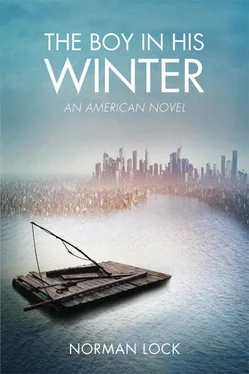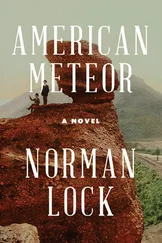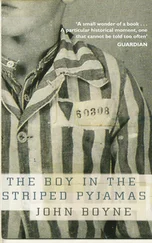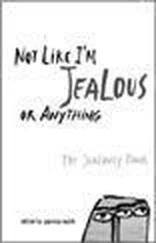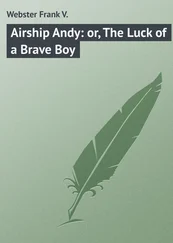“When we get to Panama City, I know a little gal who’ll cheer you up,” said James.
“Who’s she?”
“My own sweet little daughter.”
James had daughters and sons scattered all along the Gulf Coast, spawned during youthful adventures as a smuggler of Trinidad rum and Brazilian absinthe, a deckhand and, later, a second mate aboard an oil tanker. He marked his children’s positions on a map kept with his gear. Some he called dangerous reefs; others, happy isles. He was on friendly terms with three of his “wives” and liked to visit them when he could for a home-cooked meal and a familiar, warm, and fragrant bed.
“Her name’s Sophie. She’s about your age and wants to be a ballerina. I got a present for her.”
We cruised more or less easterly toward the west coast of Florida, keeping well offshore — again, so as not to attract attention. Edmund butchered the marlin and stuffed the refrigerated fish boxes under the cockpit deck with meat. He kept a couple hunks to rot in the sun, which they soon did, and stunk. Is that the past tense of stink ? I used to have a grammar book and a manual of style, but they’re both long gone. I don’t intend to say anything else about fishing, although we did fish a little each day for the sake of appearances. One dead fish is very much like another. If people want to read about the fishing we did aboard the Psyched, they can buy The Old Man and the Sea. This is not that kind of book. To be honest, I’m not sure what kind of book this is.
You want to know why Edmund left the meat to rot?
For the same reason Edgar bought me a dog when we got to Panama City. And for the same reason the brothers wanted me along on the trip to Atlantic City.
You think I’m giving too much away? That I should wait for a more dramatic moment in my tale than this, the tearful aftermath of a fish’s destruction — all tension spent? Story line and fishing line, both gone slack.
Maybe you’re right, and I should wait at least until we get to Panama City and the dog. Storytelling is all about well-timed revelations. But I’m annoyed by writers who manipulate me, parceling out information as though they were dealing dope. To hell with narrative strategy! The moment seems right to me — now that I’ve shown how inadequate a gaff boy and deckhand I was — to reveal the reason for my being on board. The brothers used me as window dressing, in case the Coast Guard boarded us. With me leaning on a gaff, like a shepherd in a Christmas play, we were likely to be taken for a party of sportsmen instead of marijuana smugglers. For days, the brothers had been conditioning me to call them “Uncle.” (James was always James.)
The stinking meat and the dog? Edgar’s idea. He reasoned they’d throw a drug-sniffing hound off the scent. He had a subtle intelligence for a former garage mechanic, waterman, and roustabout. Edmund’s career was checkered with sojourns in reformatory and the county jail. What he did when he was at large involved — in their seasons — crab traps, a pick and shovel, supplying raw material to the proprietors of whiskey stills in the Louisiana backwoods. I don’t know what this book is about, but it feels like it might have something to do with the embarrassing notion of goodness. And its apparent scarcity.
Do I believe in it?
I’m still undecided. A boy, I did not judge people as I do now, according to a complicated Hammurabi’s code constructed of absolutes mitigated by fear, doubt, self-interest, and that “golden rule,” the quid pro quo. A boy, I judged as the sponge or oyster does the water it imbibes: by recoil and painful shock or a vague sense of well-being. Children are unconscious of good and evil and remain that way until they reach the age of self-regard. The adolescent discovers a tiny universe of the self with his first pimple and plunges headlong into a lifetime of dubious ethical transaction with the wider world.
I thought of Edmund as a Morlock fattening on the Eloi, one of whom could have been his brother, Edgar. Edmund was gross in body and soul, gruff and stolid, while Edgar was fast on his feet, quick-witted, and eloquent in a rough-spoken way. I would not have called Edgar handsome, but he had a liveliness and a lightness of touch that made him attractive, despite the error of his ways. He was surely not the best of men, but he was hardly the worst. Edmund was a reprobate: a man to be wary of. When the brothers fought — they seemed to be constantly at each other’s throats — I hid. James found their brawls amusing and would watch them scuffle like two bantam roosters in the cockpit. They fought over priority (Edgar was older by a year), percentages (Edgar wanted a larger one for having planned the job), and my value to the “consortium” (Edgar insisted I be paid a thousand dollars; Edmund wanted to give me nothing).
“He’s useful,” Edgar said with a coolness that belied the mounting temperature of his blood. He was slow to anger but would boil over without warning.
“He’s a useless sack of excrement,” Edmund grumbled, playing with his knife.
I was unnerved to find myself the fulcrum of their hate and went outside to James, who was putting a skirt on a naked ballyhoo. I watched his nimble hands thread the hook through the small creature’s eyes and wished I were elsewhere — back in Hannibal with Tom Sawyer, playing tricks on Jim or the spiteful spinsters. Tom had been the brains of our operation, and it had been fine not to think much or weigh the consequences of our pranks. James’s hands were scaly like the fish — from psoriasis. At that instant, he seemed part fish himself, whose element, like mine, is water. And by Tom’s harebrained hydrological theory, Jim would swim throughout my life — and did, in James and in one other we have yet to meet.
“I’m sorry you got tangled up in this,” James said, trimming the leader line.
I did feel an awful lot like a fish rising in a water column toward a baited ballyhoo and net. But there are motions that have an omnipotence impossible to resist — call them fate or accident or chance — fight them as you will. I was caught up! And maybe the bait to which I’d eagerly given my mouth had danced before my eyes way back when, in Hannibal, in water shining on the mudflats, or even before, in a spurt of Finn blood that came from my pap or his — conceived at the dawn of time, with the latching of a distant pair of chromosomes. Concocted in a primal ooze or, more remotely still, with the cooling of a star — its death and aftermath in me.
“Edmund scares me,” I said.
“Of the two, Edmund’s the less dangerous,” James said.
That surprised me!
“He’s a mean bastard you know you can’t trust and have to watch. But Edgar’s greedy and ruthless, too, only they don’t show on him like they do on his brother.”
“Edgar wants to give me a thousand dollars,” I said, offering it as proof of his goodness.
“You don’t have it in your pocket yet — do you, Mr. Albert? Besides, that’s a drop in the ocean of what he hopes to make out of this job.”
I wanted to ask James why he had signed on for it, but I didn’t. I must have suspected even then that a smile and a pleasant word could be a pretty whitewashed fence around a house of horrors. I didn’t want to know what James was like on the inside. I needed someone on that boat to admire. And — it’s true! — I had begun to think that maybe Jim had gotten into James — was passing through on his way to who knows where — to look after me. I told you I was a romantic!
It may not have been Panama City where Edgar bought the dog. Last night, I was waiting to fall asleep and thinking over my story, when I remembered we had stopped for fuel between Gulfport and Panama City. It must have been Biloxi, and Edgar didn’t buy the dog; he found it on the dock, licking grease from a hamburger wrapper. He was mangy, old, and starved — perfect for Edgar’s purpose: to confuse the nose of dogs conscripted for the drug wars. Our dog, which I named Duke, fell overboard forty miles off Sanibel, near the Florida coast, and was eaten by sharks lured, no doubt, by its smell. And so are man’s devious ways confounded by nature or by chance. I had emptied my reservoir of tears for the marlin; it had not yet been replenished by optimism or hope. Duke went into the bloody maw, unwept by me, although not unmourned.
Читать дальше
